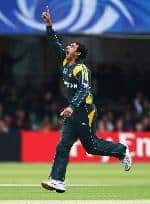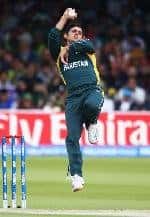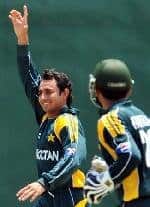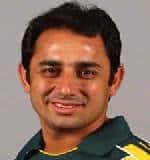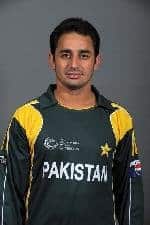Paksitan Cricket Team Bowler
Saeed Ajmal was born on 14th October 1977 in Faisalabad. He is a Pakistani cricketer. He is a right-arm off-spin bowler who also uses the Doosra to good effect.Ajmal has played for Faisalabad since his debut in 1995 at the age of 18, also representing Khan Research Laboratories and occasionally Islamabad. After a successful season in 2007–08 for Khan Research Laboratories, he was named in Pakistan’s squad for the 2008 Asia Cup. He made his debut against India, taking the wicket of Yusuf Pathan in an eight-wicket victory, before taking two wickets in a ten-wicket victory over Bangladesh, although the team had no chance of progressing to the competition’s final.From there he has had a rapid rise in the team in just over a full year. He had an excellent time at the 2009 ICC World Twenty20, bowling at an economical rate and regularly taking wickets along with his spin partner Shahid Afridi. He was then picked for the Sri Lankan series in Sri Lanka where he had made solid performances in the Test matches, being picked ahead of Danish Kaneria in two of the matches.
A modern-day offspinner who relies on the doosra as much as on other variations of flight and speed, Saeed Ajmal made a relatively late entry into international cricket, at the age of 30, but is doing his best to make up for lost time, quickly moving up to be regarded among the best spinners in the game today. Ajmal didn’t play his first Test till almost 32, but showed immediately that he belonged, taking five wickets in his debut Test against Sri Lanka in Galle in 2009.
His golden run, though, started in 2011, when he showed superb control over all his variations – the offspinner, the doosra and the subtle changes in speed and flight. Unlike many offspinners who change their line when bowling the doosra, Ajmal tends to bowl the offspinner and the doosra from around the same line – on or just outside off – which makes it much tougher for batsmen to pick his variations. In 2011 he was the leading wicket-taker in Tests, with 50 in eight matches. But the best series of his young career came early in 2012, when he destroyed the batting line-up of the best team in the world, England, taking 24 wickets in just three games at 14.70. In the process, he clearly won the battle of offspinners against the highly rated Graeme Swann.
However, Ajmal first made his mark in international cricket in ODIs. He was called up for the 2008 Asia Cup, and soon after he had the Australians completely bewildered in the ODI series in the UAE; he gave away few runs and his doosra was almost unreadable. The ICC called him for his action, though it was cleared soon after. The pressure didn’t get to him and immediately after, he played a crucial role in Pakistan’s drive to the 2009 World Twenty20 title, regularly bottling up the middle overs with Shahid Afridi. He ended the joint second-highest wicket-taker in the tournament, with an exemplary economy rate as batsmen around the world struggled to get a read on his bag of tricks.
Domestic career
Ajmal has played for Faisalabad since his debut in 1995 at the age of 18. Ajmal represented the Faisalabad Wolves in the 2005 ABN-AMRO Twenty-20 Cup, his team won the final in which he was man of the match. When Faisalabad won the final of the ABN-AMRO Patron’s Cup in March 2006 Ajmal was named the tournament’s best bowler and was given a Rs 25,000 prize. He has also represented Khan Research Laboratories, who were runners-up in the final of the 2008/09 Quaid-i-Azam Trophy; though his side lost the final, Ajmal took 5/105 and 2/55 and in the process passed 250 first-class wickets. Ajmal has also played for Islamabad.
International career
Pakistan hosted the Asia Cup in June 2008; Ajmal was included in the 15-man squad and was expected to act as a foil to Shahid Afridi’s leg spin. He made his debut against India on 2 July 2008. Ajmal took a single wicket, that of Yusuf Pathan, from his ten overs while conceding 47 runs (1/47) as Pakistan won by eight wickets. before taking 2/19 in a ten-wicket victory over Bangladesh, although the team had no chance of progressing to the competition’s final. In November that year Pakistan travelled to the United Arab Emirates to face the West Indies in a three-match ODI series. Ajmal and Afridi were the team’s only spin options; the former took a single wicket while conceding 73 runs and Pakistan won all three matches.
Ajmal’s next match the third ODI against Sri Lanka in January 2009. In April Pakistan faced Australia in the UAE in five ODIs. Playing in all five matches Ajmal took four wickets at an average of 39.50. He was then picked for the Sri Lankan series in Sri Lanka where he had made solid performances in the Test matches, being picked ahead of Danish Kaneria in two of the matches.
In April 2009, Ajmal was reported by umpires for having a suspect bowling action. An independent test the following month demonstrated that Ajmal’s arm flexed within the 15 degree tolerance allowed by the International Cricket Council.Later that year, the Pakistan Cricket Board named a pool of 30 players from which they would chose their final squad for the 2009 ICC World Twenty20, held in June. Initially left out, Ajmal was one of three players added to the list, replacing players who were dropped because they were contracted with the controversial Indian Cricket League. In the tournament, Ajmal partnered Afridi. Pakistan won the tournament, and Ajmal was the tournament’s joint second highest wicket-taker with twelve dismissals from seven games (only Pakistan’s Umar Gul took more wickets, with thirteen dismissals).
Ajmal’s good form continued in the 2010 ICC World Twenty20 as he was Pakistan’s leading wicket taker. However despite his good form he was known for conceding three sixes to Michael Hussey in what has been hailed as the most thrilling Twenty20 match of all time as Australia were in trouble and Ajmal was the unfortunate bowler who bowled that final over.
Shortly after this the Pakistan team began a tour of England where they would face Australia in two Tests in July, and subsequently play England in four Tests and five ODIs. Danish Kaneria was preferred to Ajmal in the first match against Australia, but after Pakistan lost the selectors considered dropping the leg-spinner and chosing Ajmal. In the event, Ajmal was not selected until the second Test against England, when Kaneria was dropped because he had been ineffective. Though Pakistan lost the match by nine wickets, Ajmal took his first five-wicket haul in Tests. In Pakistan’s second innings, with his team looking to set a target for England to chase, Ajmal scored 50 from 79 balls, his first half-century in Tests, before he was dismissed by fellow off spinner Graeme Swann.
During the series against England Pakistan became englufed in a spot fixing scandal after the fourth test and in a later secret interview it was unveiled by alleged fixer Mazhar Majeed that Ajmal, Abdul Razzaq, Younis Khan and Shahid Afridi were difficult to bribe. He stated that Ajmal was too religious to get involved into fixing.
After the controversy and upheaval of 2010, 2011 saw Pakistan become a more consistent team. The year began with the World Cup held between February and April. Pakistan progressed to the semi-final, where they were defeated by India; playing in three of the team’s matches, Ajmal took five wickets at an average of 18.60. After the World Cup, Pakistan played ten Tests, winning six andlosing a single match; this saw the team win series against Bangladesh, New Zealand, Sri Lanka, and Zimbabwe, and draw with the West Indies. Ajmal finished the year with 50 wickets from 8 Tests, more than any other bowler (second on the list was India’s Ishant Sharma with .Pakistan were also largely successful in ODIs, winning 24 out of 32. After Pakistan beat Sri Lanka 4–1 in November 2011, Ajmal climbed to the number one spot in the the ICC’s ODI rankings. He finished the year by taking nine wickets over two Tests in Pakistan’s tour of Bangladesh.
Pakistan started 2012 with a three Test series against England in the United Arab Emirates. Ajmal was named the man of the match for the First Test in Dubai, with match figures of 10 wickets for 97 runs and a career-best 7/55 in England’s first innings.
Bowling style
A right-arm off spinner, Ajmal’s stock delivery turns into right-handed batsman but he also frequently uses the doosra which turns the other way, and he generally bowls flatter than most off spinners. The doosra has been an effective tool for Ajmal as batsmen have often failed to pick it. Explaining his bowling style in 2012, Ajmal said “If I bowl with flight I cannot bowl well. If I bowl at a quicker speed I can then use variations in pace. If I take 90% of my wickets with the doosra why should I not bowl it? Whether you bowl a doosra or an offbreak, the ball should be bowled on the right line and one should take a wicket with it.
Records and Achievements
Saeed Ajmal is the fastest Pakistani bowler to reach 100 wickets in test cricket.
Interview
Naturally Saeed was delighted at being included in the one day squad for the forthcoming series against Australia in the Emirates and thanked Allah for his selection.
Saeed stated that he was happy with his form and fitness and really looking forward to the one day series in the Emirates against such high class opposition.
Saeed confirmed that the team will be leaving for Dubai on 13th April and that they will play 2 warm up matches in Dubai prior to the series commencing on the 22nd April. The warm up matches will consist of Pakistan versus Pakistan “A” teams and all 15 squad players will be involved in the matches. The matches will be played on 15th and 16th April.
Saeed spoke about the recent fitness tests conducted by the PCB prior to selection of the squad. He stated that the tests were much tougher than previous fitness tests that had been conducted by the PCB before squad selection and the players had really been pushed hard at the fitness tests. In Saeed’s own words “he couldn’t walk for 2 days after the fitness tests had been done”.
Saeed also stated that all the players have had the fitness tests apart from Shoaib Malik, Shahid Afridi and Younis Khan who are still to undergo the tests. The reason for the delay in Malik’s fitness test is due to an injury he sustained for PIA in the RBS Cup final. Afridi’s, Malik’s and Younis’s fitness tests are due to take place on 9th April.
I spoke to Saeed about the Australian team and he said that it didn’t matter who they selected they would be very tough to beat. They are still the number one side added Saeed and it doesn’t matter who they select, the players will be of a very high quality. Even the youngsters they select who are new to international cricket seem to be very mature and very talented.
I asked Saeed if he could single out one player on the opposition who the Pakistan bowlers needed to keep a close eye on and he stated that David Hussey if selected looked in very good form and hits a cricket ball a long way.
I wished Saeed all the best, regards and well wishes.
Saeed Ajmal Pictures
|
|
|
| ||||||||
|
|
|

